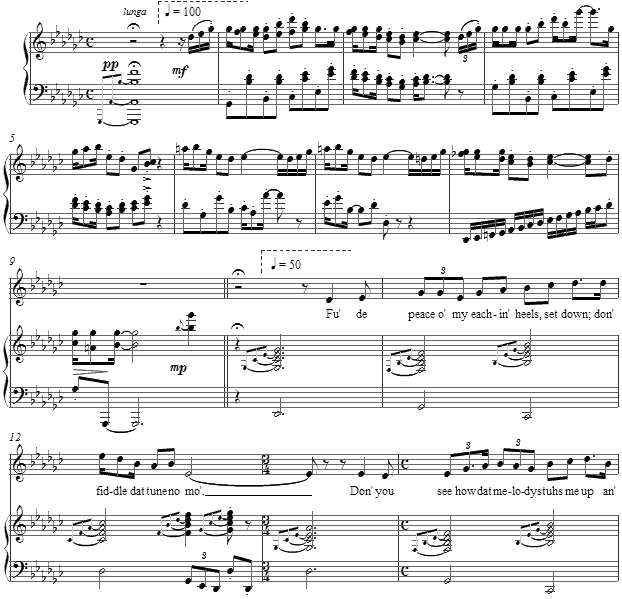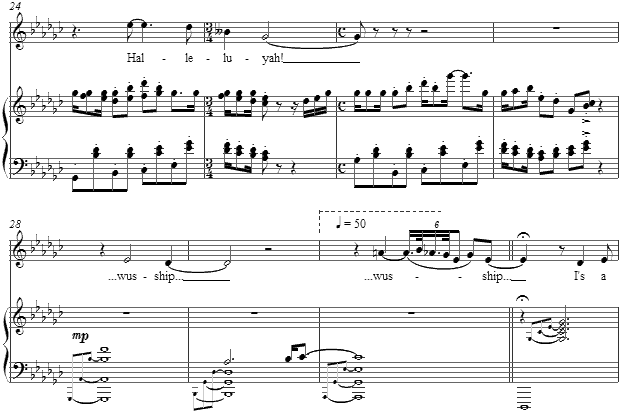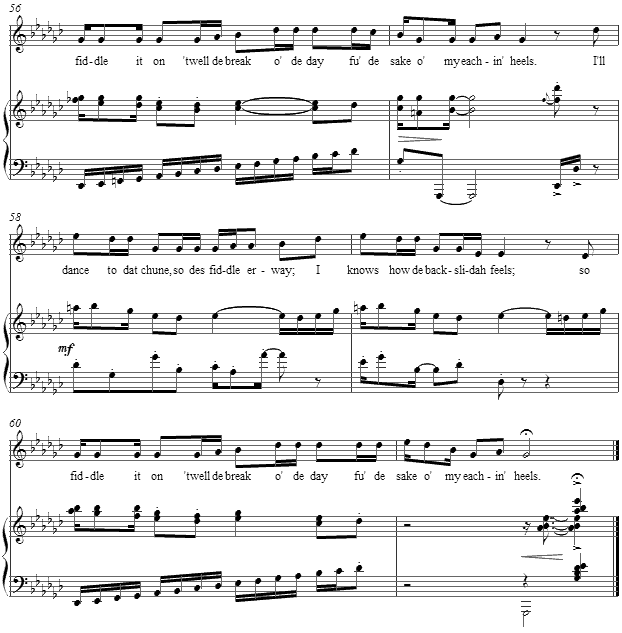Music and Texts of GARY BACHLUND
Vocal Music | Piano | Organ | Chamber Music | Orchestral | Articles and Commentary | Poems and Stories | Miscellany | FAQs
Itching heels - (2010)
Paul Laurence Dunbar
for medium voice and piano
Fu' de peace o' my eachin' heels, set down;
Don' fiddle dat chune no mo'.
Don' you see how dat melody stuhs me up
An' baigs me to tek to de flo'?
You knows I 's a Christian, good an' strong;
I wusship f'om June to June;
My pra'ahs dey ah loud an' my hymns ah long:
I baig you don' fiddle dat chune.
I 's a crick in my back an' a misery hyeah
Whaih de j'ints 's gittin' ol' an' stiff,
But hit seems lak you brings me de bref o' my youf;
W'y, I 's suttain I noticed a w'iff.
Don' fiddle dat chune no mo', my chile,
Don' fiddle dat chune no mo';
I 'll git up an' taih up dis groun' fu' a mile,
An' den I 'll be chu'ched fu' it, sho'.
Oh, fiddle dat chune some mo', I say,
An' fiddle it loud an' fas':
I's a youngstah ergin in de mi'st o' my sin;
De p'esent 's gone back to de pas'.
I 'll dance to dat chune, so des fiddle erway;
I knows how de backslidah feels;
So fiddle it on 'twell de break o' de day
Fu' de sake o' my eachin' heels.[ 5 pages, circa 3' 35" ]
Paul Laurence Dunbar
The text is drawn from Dunbar's early, self-published collection, When Malindy Sings, 1896. I have thought that the poet's fine example of believing in his works deserves special appreciation. The dialect of the poem is wonderful, with some dropped consonants, amusing endings such as "f" replacing "th" and "ch" replacing "t", spread diphthongs written out, but especially Dunbar's insistence that "itching" is properly pronounced "eachin'."
The three stanzas are structured dramatically as a protest which proves itself false -- don't play the infectious tune turns to "fiddle that chune" by the last stanza. For this the structure of the tempi relationships is clear, slow and fast in alteration, a musical "yes/no." This is of course a common element to mankind, as here in Berlin, the language includes the lovely "Jein," a compilation of "ja" and "nein" into a single and most comprehensive yes/no. Dunbar captures an era and culture with his use of language most admirably, as he shows how infectiously a tune can make a "backslidah." For this I confess, myself, quite happily to be a backslider in merely finding the melodies for this poem.
Including the word of praise, "hallelujah," and repeating the word, "wusship," gives a sense of the true lack of tension between prayer on the one hand and music and dance on the other, when they are considered all as expressions of life's fullness. Though not in Dunbar's text, I find this in his dramaturgy which stands behind the poem.
The ending of the setting reprises the last lines with joyful exuberance, the "old made young" through "dat chune."
The score for Itching Heels is available as a free PDF download, though any major commercial performance or recording of the work is prohibited without prior arrangement with the composer. Click on the graphic below for this piano-vocal score.



